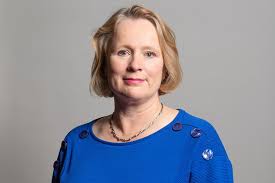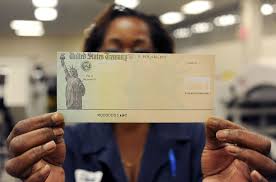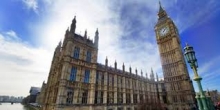Work TV
Watch our TV Channel dedicated to the ‘World of Work’. Explore our video library for informative videos featuring career opportunities at leading companies, franchising opportunities, further education and recruitment professions and their services.
Simon Collyer
Government Furlough Scheme Extended Lockdown Due to Start
FURLOUGH SCHEME - Johnson said that the government’s furlough job protection scheme, which had been expected to expire within hours, would be extended through November, with the state guaranteeing 80 percent of furloughed workers wages.
This is the governments press release:
With the NHS weeks from being overwhelmed, and a higher death toll than the first wave predicted without new restrictions, the Prime Minister, Chief Medical Officer, Chief Scientific Advisor, and Cabinet agreed there was no alternative to tougher national measures.
The Prime Minister will update Parliament on Monday, and MPs are set to vote on the measures on Wednesday. This follows a Cabinet chaired by the Prime Minister earlier today.
He said that no one wants to impose these kinds of measures, but no responsible Prime Minister could ignore the evidence presented.
He also said that, whilst Christmas will inevitably be different this year, tough action now could mean families may be able to be together.
Belgium, France, Germany and other countries have already put in place national restrictions, following earlier local measures.
From Thursday 5 November, everyone must stay at home, and may leave only for a limited set of reasons. These include:
- For education;
- For work, if you cannot work from home;
- For exercise and recreation outdoors, with your household, support bubble or on your own with one person from another household;
- For all medical reasons, appointments and to escape injury or harm;
- To shop for food and essentials;
- And to provide care for vulnerable people, or as a volunteer.
A full set of exemptions will be set out in law.
Single-adult households will still be able to form an exclusive support bubble with one other household, and children can move between homes if their parents are separated.
Non-essential shops, leisure and entertainment venues will be closed. Click and collect services can continue and essential shops, including supermarkets, will remain open, so there is no need for anyone to stockpile.
Pubs, bars, restaurants must close, except for takeaway and delivery services.
People should work from home wherever possible. Workplaces should stay open where people cannot work from home – for example, in the construction or manufacturing sectors.
Shielding as practised in the spring will not currently be reintroduced. The clinically vulnerable, or those over the age of 60, should be especially careful to follow the rules and minimise contacts with others. Those who are clinically extremely vulnerable should not only minimise their contacts with others, but also not go to work if they are unable to work from home.
There is no exemption for staying away from home on holiday. This means people cannot travel internationally or within the UK, unless for work, education or other legally permitted exemptions. Overnight stays away from primary residences will not be allowed, except for specific exceptions including for work.
Inbound international travel will continue to be governed by the travel corridor approach, and those currently on a domestic holiday will be allowed to finish their holidays, but are still subject to the requirements in England not to go out without a reasonable excuse.
Public services, such as job centres, courts, and civil registration offices will remain open.
There is no exemption for communal worship in places of worship (except funerals and individual prayer), organised team sports, or children’s activities.
Elite sport will be allowed to continue behind closed doors as currently.
The Coronavirus Job Retention Scheme, known as the furlough scheme, will remain open until December, with employees receiving 80% of their current salary for hours not worked, up to a maximum of £2,500. The cost for employers of retaining workers will be reduced compared to the current scheme, which ends today.
As the Prime Minister and Education Secretary have said, keeping young people in education is a national priority so early years settings, schools, colleges and universities will all remain open. Parents and carers should make sure their children keep attending school. However, universities and adult learning providers should consider increasing online provision where possible.
Parents will still be able to access registered childcare and other childcare activities where reasonably necessary to enable parents to work. Parents are also able to form a childcare bubble with another household for the purposes of informal childcare, where the child is 13 or under.
Ministers are also clear that it is vital to keep the provision for non-Covid healthcare needs going. Unless clinicians tell patients otherwise, they should continue to use the NHS, get scans and other tests, turn up for all appointments and collect medicines and treatments.
Ministers have done everything in their power to avoid another national lockdown.
The natural rate of R is around 3, meaning local restrictions have helped slow the spread of the virus, whilst NHS Test and Trace is testing more than any other country in Europe.
But the R rate is still above 1, meaning infections, hospitalisations and deaths continue to double, and the virus is now a national problem.
On present trends, in the South West, where incidence is low for example, it is clear they would run out of hospital capacity in a matter of weeks unless we act.
Whilst work is underway to boost capacity, including preparing the Nightingales, it is impossible to create extra bed space, and recruit extra doctors and nurses, at the rate necessary to outpace the virus.
Also:
The Coronavirus Job Retention Scheme has been extended for a month with employees receiving 80% of their current salary for hours not worked and further economic support announced.
Published 31 October 2020
From:HM Treasury and The Rt Hon Rishi Sunak MP

People and businesses across the UK are being provided with additional financial support as part of the government’s plan for the next phase of its response to the coronavirus outbreak, the Prime Minister announced today (31 October).
Throughout the crisis the government’s priority has been to protect lives and livelihoods. Today the Prime Minister said the government’s Coronavirus Job Retention Scheme (CJRS) - also known as the Furlough scheme - will remain open until December, with employees receiving 80% of their current salary for hours not worked, up to a maximum of £2,500. Under the extended scheme, the cost for employers of retaining workers will be reduced compared to the current scheme, which ends today. This means the extended furlough scheme is more generous for employers than it was in October.
In addition, business premises forced to close in England are to receive grants worth up to £3,000 per month under the Local Restrictions Support Grant. Also, £1.1bn is being given to Local Authorities, distributed on the basis of £20 per head, for one-off payments to enable them to support businesses more broadly.
To give homeowners peace of mind too, mortgage holidays will also no longer end today.
Chancellor Rishi Sunak said:
Over the past eight months of this crisis we have helped millions of people to continue to provide for their families. But now - along with many other countries around the world - we face a tough winter ahead.
I have always said that we will do whatever it takes as the situation evolves. Now, as restrictions get tougher, we are taking steps to provide further financial support to protect jobs and businesses. These changes will provide a vital safety net for people across the UK.
Job Retention Scheme
Employers small or large, charitable or non-profit, are eligible for the extended Job Retention Scheme, which will continue for a further month.
Businesses will have flexibility to bring furloughed employees back to work on a part time basis or furlough them full-time, and will only be asked to cover National Insurance and employer pension contributions which, for the average claim, accounts for just 5% of total employment costs.
The Job Support Scheme, which was scheduled to come in on Sunday 1st November, has been postponed until the furlough scheme ends.
Additional guidance will be set out shortly.
Mortgage Holidays
Mortgage payment holidays will no longer end today. Borrowers who have been impacted by coronavirus and have not yet had a mortgage payment holiday will be entitled to a six month holiday, and those that have already started a mortgage payment holiday will be able to top up to six months without this being recorded on their credit file.
The FCA will announce further information on Monday.
Business Grants
Businesses required to close in England due to local or national restrictions will be eligible for the following:
- For properties with a rateable value of £15k or under, grants to be £1,334 per month, or £667 per two weeks;
- For properties with a rateable value of between £15k-£51k grants to be £2,000 per month, or £1,000 per two weeks;
- For properties with a rateable value of £51k or over grants to be £3,000 per month, or £1,500 per two weeks.
Today’s announcements are only part of the government’s world-leading economic response to coronavirus – the largest package of emergency support in post-war history – to protect, create and support jobs.
The furlough scheme protected over nine million jobs across the UK, and self-employed people have received over £13 billion in support. This is in addition to billions of pounds in tax deferrals and grants for businesses.
Further information
GRANTS
- Business grant policy is fully devolved. Devolved Administrations will receive Barnett consequentials which they could use to establish similar schemes.
JOB RETENTION SCHEME
- This extended Job Retention Scheme will operate as the previous scheme did, with businesses being paid upfront to cover wages costs. There will be a short period when we need to change the legal terms of the scheme and update the system and businesses will be paid in arrears for that period.
- The CJRS is being extended until December. The level of the grant will mirror levels available under the CJRS in August, so the government will pay 80% of wages up to a cap of £2,500 and employers will pay employer National Insurance Contributions (NICs) and pension contributions only for the hours the employee does not work.
- As under the current CJRS, flexible furloughing will be allowed in addition to full-time furloughing.
- Further details, including how to claim this extended support through an updated claims service, will be provided shortly.
- The Job Support Scheme will be introduced following the end of the CJRS.
Who is eligible?
Employers
- All employers with a UK bank account and UK PAYE schemes can claim the grant. Neither the employer nor the employee needs to have previously used the CJRS.
- The government expects that publicly funded organisations will not use the scheme, as has already been the case for CJRS, but partially publicly funded organisations may be eligible where their private revenues have been disrupted. All other eligibility requirements apply to these employers.
Employees
- To be eligible to be claimed for under this extension, employees must be on an employer’s PAYE payroll by 23:59 30th October 2020. This means a Real Time Information (RTI) submission notifying payment for that employee to HMRC must have been made on or before 30th October 2020.
*As under the current CJRS rules: - Employees can be on any type of contract. Employers will be able to agree any working arrangements with employees.
- Employers can claim the grant for the hours their employees are not working, calculated by reference to their usual hours worked in a claim period. Such calculations will broadly follow the same methodology as currently under the CJRS.
- When claiming the CJRS grant for furloughed hours, employers will need to report and claim for a minimum period of 7 consecutive calendar days.
- Employers will need to report hours worked and the usual hours an employee would be expected to work in a claim period.
- For worked hours, employees will be paid by their employer subject to their employment contract and employers will be responsible for paying the tax and NICs due on those amounts.
What support is being provided and employer costs:
- For hours not worked by the employee, the government will pay 80% of wages up to a cap of £2,500. The grant must be paid to the employee in full.
- Employers will pay employer NICs and pension contributions, and should continue to pay the employee for hours worked in the normal way.
- As with the current CJRS, employers are still able to choose to top up employee wages above the scheme grant at their own expense if they wish.
- The Government will confirm shortly when claims can first be made in respect of employee wage costs during November, but there will be no gap in eligibility for support between the previously announced end-date of CJRS and this extension.
ABC Comment, have your say below:

Simon Collyer, ABC Founder, Appears on BBC Radio Essex Breakfast Show This Morning
NEGATIVE INTEREST RATES – Simon Collyer appeared on BBC Essex, Radio Breakfast Show, this morning talking about negative interest rates.
Negative interest rates are used when a central bank such as the Bank of England (BoE) wants to create inflation by boosting demand in the economy. By forcing banks to pay interest on the money they hold they are better off lending it. There was lots of talk about the banks charging customers interest for holding their money, but the reality is that all money is borrowed into existence and banks have to pay the BoE interest.
In reality banks may absorb this cost initially because customers can easily migrate to banks that do not charge customers for keeping their cash on deposit.
Cash on deposit by savvy savers will get used to buy shares and bonds with or gold. The people who will get hit if negative rates are introduced are the savers. Not only will they pay a fee but rising inflation with reduce the purchasing power of money. Thus, moving cash into real assets is a way of preserving its value. Buying individual shares is risky but index funds linked to the overall value of the stock market are a safer bet. Gold is very volatile and does not pay interest, but when there are inflation fears it tends to do well price wise.
Your granny and her gold wedding ring and jewellery was walking around with her ‘rainy day’ money on her person.
ABC Comment, have your say below:

Pressure Mounts On UK Govt To Make Universal Credit Uplift Permanent
NEW REPORT - Almost half of Scottish workers faced pay cuts due to Covid-19
Pressure is mounting on the UK Government to enhance the job support scheme and make the £20 uplift to Universal Credit payments permanent - after a new report revealed that almost half of workers in Scotland had their pay cut due to the Covid-19 pandemic.
In the report, IPPR Scotland urges the Tories to make the temporary increase to Universal Credit permanent and recommends that they remove the benefit cap and two-child limit, described as “the most pernicious parts of the UK-wide benefit system […] which were wrong even in the pre-pandemic context.”
The think tank also says the UK government must "enhance its job support scheme to avoid needless unemployment" and warns that "if the UK government is unwilling to act, it must ensure the Scottish government can do so."

Image: SNP MSP Shona Robison.
SNP MSP Shona Robison said:
“Far too many people across the UK are living with the constant threat of unemployment and poverty, with the coronavirus crisis only exacerbating the financial challenges facing families.
“The Scottish Government is doing everything it can to support families and mitigate Westminster cuts, but there’s only so much we can do with limited powers.
“As this new report makes clear, if the UK government is unwilling to act, it must ensure the Scottish Government can. By withholding crucial funding and blocking the devolution of financial powers, this Tory government is threatening the future of Scottish jobs and businesses.
“Now is the moment to help those who are struggling to stay afloat through no fault of their own - not cut them adrift. If the Tories fail to act, we could see long-lasting damage for generations to come.”
ABC Comment, have your say below:

The School Breakfast Bill, Lets Get Behind it Say Campaigners
MAJIC BREAKFAST -The School Breakfast Bill was presented to Parliament by Emma Lewell-Buck MP on 13th October, and successfully passed its first reading. The second reading of the Bill is currently scheduled for 5th February, 2021.
Six children in every class of thirty are at risk of starting the day too hungry to learn. The School Breakfast Bill will give state funded primary and secondary schools the support they require to provide a free breakfast to pupils, where there is evidence of need, or where a specific request is made. This will ensure that children from disadvantaged backgrounds benefit fully from the education system and have the chance to reach their full potential, levelling up opportunities for young people across the country.
The Bill is now supported by over 70 MPs from all parties and campaigners want to continue to grow this number.
While there are many reasons schools attributed to the perceived increase in child hunger and poverty, some of the most common include:
- Universal credit roll-out. This has resulted in many families receiving delayed benefit payments causing increased strain on resources for periods of time and requiring families to take a new approach to budgeting.
- Zero-hour contracts remain a problem in some communities meaning families are reliant on food parcels, for example, between periods of work.
- Schools are increasingly referring families to food banks and/or providing food parcels for families.
- Increased number of children eligible for Free School Meals or Pupil Premium on roll, and/or pupils arriving at school hungry.
https://twitter.com/i/status/1316043564678348802
“We did have a couple of children who really did cry with the hunger. They didn't know what was wrong with them. They would say that their tummy was sore. But when you asked them 'When did you last eat?' or asked if they'd had anything that morning, you found they hadn't.” Patricia McGowan, the head of Abercorn Secondary, Glasgow, interviewed by the i newspaper.
“At about 11:30 children start going to the classroom door because they can smell the school lunch and are hungry. They can’t wait to get into the main hall to eat. We have to ask them to sit down and wait. It’s heartbreaking.”
You can donate to the majic breakfast, please click below:
ABC Comment, have your say below:

To read a background briefing document on the School Breakfast Bill please download below.

Protections for Working Parents Eligible for Childcare Support
CHILDCARE - Working parents who are on the Government’s coronavirus support schemes will still be eligible for childcare support even if their income falls below the minimum threshold requirement.
The Government has confirmed that from Sunday 1 November, eligible working parents who receive support through the Government’s new Job Support Scheme (JSS) and extended Self-Employed Income Support Scheme (SEISS) will continue to receive their childcare entitlements, including the 30 hours offer and Tax-Free Childcare, even if their income levels fall below the threshold temporarily whilst on these schemes.
It comes as new data shows that more parents are returning to their formal childcare settings and getting back to work after the impact of the pandemic. Official statistics on early years have found that children’s attendance at the majority of nurseries, preschools and childminders is starting to climb back to pre-pandemic levels.

Image: Children and Families Minister Vicky Ford.
Children and Families Minister Vicky Ford said:
This Government is increasing the safety net available to families, protecting working parents and our dedicated early years sector. This has been our constant priority, which is why I am so pleased to see attendance rates rising, as more parents return to work and take up the formal childcare arrangements they used before Covid-19 struck.
It’s testament to the hard work of early years professionals that these numbers are returning to what we would have seen before the pandemic.
We know challenges remain for many families, which is why we continue to protect parents’ eligibility for our free childcare offers so they retain this vital support.
Attendance data reveals that more parents are returning to their formal childcare settings, with attendance at early years settings now at 86% of pre-coronavirus daily levels. This is set to increase further as, data published today in the latest parent survey by Ipsos MORI, shows that in September 94% of parents whose child received formal childcare before the pandemic were either using formal childcare now, or were intending to return their child to formal childcare if they could by January 2021.
It also shows that among those families who had returned to using formal childcare in September 71% were at the same nursery, preschool or childminder as before the pandemic, while exactly half were using the same number of hours of formal childcare as before. Only one in eight were using fewer hours, while more than one third (35%) had increased their hours of formal childcare.
Karl Khan, Director General HMRC Customer Service said:
HMRC remains ready to help all customers as part of the government’s response to the pandemic, including those who benefit from Tax-Free Childcare.
We want everyone to get the money they are entitled to, and there’s a range of support available to help families with childcare costs. We’d encourage parents to check the Childcare Choices website to see which offers will work best for them.
The Job Support Scheme and extension to Self-Employed Income Support Scheme have been launched to replace the Government’s Coronavirus Job Retention Scheme, which ends on 31 October.
The minimum income threshold for 30 hours free childcare and Tax-Free Childcare is usually equal to 16 hours per week at the national minimum wage. In response to the challenges faced by working parents during the pandemic, the Government announced in May that those who were previously eligible, but whose income temporarily dropped as a direct result of the pandemic, retained access to support through 30 hours free childcare or Tax-Free Childcare.
The Department for Education provides 30 hours free childcare to eligible 3- and 4-year-olds in England and has seen 180,000 applications and around 430,000 reconfirmations for 30 hours places since March 2020 demonstrating the importance of protecting parents’ eligibility.
Extending the support further builds on the Government’s continued commitment for those parents who still need it. In addition to protecting parents’ eligibility, the government has provided a significant package of support for the early years sector over the past months to provide stability and reassurance, including providing extra security to nurseries and childminders that are open by ‘block-buying’ childcare places for the rest of this year at the level that would have been funded before coronavirus – regardless of how many children are attending.
Providers will also benefit from a planned £3.6 billion funding in 2020-21 for free early education and childcare places. Providers in the sector remain optimistic about the future as a provider’s survey published today has found that in September, open and temporarily closed GBPs and CMs expect a minimal reduction in their opening days a week compared to before COVID-19.
ABC Comment, have your say below:

Youth Unemployment May Rise To 100,000 In Scotland
YOUTH UNEMPLOYMENT - Former Prime Minister Gordon Brown has warned that youth unemployment in Scotland could hit 100,000 in the winter.
The former Labour prime minister has called for the UK and Scottish Government to offer a “jobs guarantee” for 16-24 year olds to avert a crisis caused by the pandemic.
The odds of getting a job now are the worst in 50 years.
Under 25s suffered 60% of post march redundancies and male youth unemployment is now heading to 20 per cent
Former PM Brown tells Johnson: sort out current conflicts between Westminster and regions and bring regions and nations’ leaders into a summit to agree a coordinated employment strategy.
The Alliance For Full Employment (AFFE) is calling for a UK wide jobs summit after it is revealed that as many as ONE million young people will be unemployed by the start of November.
The Alliance For Full Employment (AFFE) says the Prime Minister must set out a joint plan agreed with the devolved governments of Scotland, Wales, Northern Ireland, and England’s city region metro mayors to tackle youth unemployment which is set to rise still further. The Youth Report published by AFFE today (Monday) states that a total of 1.5m youth placement will be needed over the coming year to deal with the increased number of young people who have nothing to do.
Report author, economist Professor Paul Gregg, says Kickstart – the government’s main youth unemployment programme – will not provide anywhere near enough places for those in need of support.
Whilst the scheme will eventually create 350,000 places, only 120,000 of the one million young unemployed appear to be eligible for a place because only those already registered as income support claimants or, as long term unemployed (6 months or over) will be able to apply.
So, most of the current unemployed and those who will lose their jobs in the coming months will fall through the net without a quickly enhanced support system.
AFFE recommend Kickstart and other youth programmes be upgraded urgently to do more to help with job search and with wage support. perhaps £100 a week, for employers for six months to take on young people as permanent employees.
The arithmetic of desolation charted in the report by Paul Gregg, Professor of Economic and Social Policy at The University of Bath will alarm every parent.
60 per cent of redundancies since March have hit the under 25s and the unemployment rate for young men already more than 3 times the adult rate – and stands at 16 per cent.
Paul Gregg, Professor of Economic and Social Policy at The University of Bath said earlier this year: By this summer almost 700,000 young people were in need to help to secure training or work including:
- 10,000 16-17 year olds legally bound to be in full-time education or training for work who were in neither
- 70,000 18-24 years olds with longer-term (6+months) unemployed status a large portion of those having significant disadvantages in the labour market
- 400,000 – 18-24-year-olds not in education or work including those waiting for a course to start or similar, mothers with a child under 3 and the severely disabled.
And as we move into winter, the jobs crisis is biting hard with four new groups now also in need of help to find work:
- Many of this summer’s 500,000 school college and university leavers
- Young people who lose their jobs on or before October 31as a result of Covid, as furlough ends
- Young people in partial lockdown areas where businesses are closed down and where young employees not eligible for furlough are being laid off
- Young people made unemployed because of the general turnover of staff, which is highest among the young, and including those on temporary contracts, who will now struggle to get new opportunities.
Overall, as month by month more young people join those needing help, the scale of supported places needed over the next year will be around 1.5 million.
Professor Gregg estimates even where eligible for Kickstart and after six months on it, as many as 250,000 of 16-24s will still be in need of post0-Kickstart help including all those for whom the support does not work and who need an alternative way forward.
Former Prime Minister Gordon Brown said:
“This report charts the arithmetic of deprivation and desolation as youth unemployment gets out of control and this that will alarm every parent in every region and nation of Britain. Today we are dealing with a far bigger challenge than in the 1980s and it needs a UK- wide jobs summit bringing together the regions and nations with the Prime Minister
“Some will say this is too difficult to organise given the current breakdown in relationships between No 10 and the regions and nations but if we do not listen to whats happening on the ground and mobilise all the resources of the whole of the UK -local and national – and work together to coordinate our response, we will fail a generation of young people as surely as we did for too long in the 1980s
“The Prime Minister should recognise that when all his initiatives- Kickstart and the other related training and jobs initiatives are taken together, they simply do not meet his promise of ‘an opportunity generation’ with help available to all. “Current plans do not yet cover a large number of young people who will need support nor do they yet all offer the high-quality work experience and training young people need. I urge the government to enact the Gregg recommendations immediately.” The top four priorities are:
- Provision of quality work experience – not a return to the Youth Opportunity Programmes (YOPs) or Youth Training Schemes of the 1980s
- Training geared to new jobs, like in care sector It and logstics , jobs linked to the recovery from lab technicians and contact tracers, to care worker and teaching assistant not training for continued unemployment.
3.Help with job searches – a vital element of getting into work, as demonstrated by the 2009 Future Jobs Fund.
4.A wage subsidy in the order of a £100 a week for six months for employers to take a young person on full-time.
Professor Gregg concludes,
” The recession in the UK has only just started, in terms of the impact on jobs, consumer confidence and firm planning. Yet because firm profitability was already low and the trading block under Lockdown, the wave of job losses will be incredibly condensed and intense between now and next April.”
He adds,” This means that the need for getting intervention on the ground is urgent and hard to get to scale in time.”
ABC Note: The Kickstart Scheme provides funding to employers to create job placements for 16 to 24 year olds on Universal Credit.
ABC Comment, have your say below:

Housing, Communities and Local Government Committee
PARLIAMENT - Housing, Communities and Local Government Committee has issued a further call for evidence on the impact of Covid-19 on tenants, landlords, rough sleepers and homelessness.
In an interim report published in May, the Committee found that successful efforts to tackle rough sleeping during the Covid-19 pandemic risked being squandered if the Government failed to implement and fund a comprehensive exit strategy. It called for dedicated funding of at least £100m a year
in long term housing support to prevent thousands of people currently in temporary accommodation returning to the streets. The Committee further warned of a looming homelessness crisis as private sector renters currently unable to pay rent, face building up debt or losing their homes when the current ban on evictions expires.
The Committee has issued an updated call for evidence to understand how effective Government support has been in tackling the negative impact of Covid-19 on tenants, landlords, rough sleepers and the homelessness. It will also consider what additional support may be needed over winter months and following the increase in infection rates.
Call for evidence
The Housing, Communities and Local Government Committee wants to hear your views. It welcomes submissions from anyone with answers to the questions in the terms of reference. More information about how to submit evidence is available here.
The Committee invites evidence on the following issues:
- How effective has the support provided by the Government been in addressing the impact of COVID-19 on tenants, landlords, rough sleepers and the homeless?
- What might the impact be of a second wave of coronavirus on homelessness and the private rented sector?
- What estimates or data are available on the number of eviction notices served during the ban on evictions?
- What are the best policy options for helping tenants with rent arrears caused by coronavirus?
The deadline for submissions is Friday 27 November
ABC Comment, have your say:

90,000 Vulnerable Pensioners in Scotland Will Automatically Receive £140 Off Their Fuel Bills
ENERGY ASSISTANCE - More than 90,000 vulnerable pensioners in Scotland will receive a winter windfall of £140 off their fuel bills thanks to UK Government efforts working with energy firms to cut their costs.
Eligible Pension Credit customers who qualify for the discount were identified after the Department for Work and Pensions cross-checked its records with energy suppliers.
Customer data was matched with records from more than 50 participating suppliers so that 95% of pensioners across the UK who will get the discount will receive it without having to lift a finger – savings totalling £137 million.
The deduction, called the Warm Home Discount Scheme, will be taken automatically from energy bills before March 2021, with most pensioners receiving their discounts between now and January.
A further 220,000 pensioners across the country who meet part of the eligibility criteria but are not yet benefiting will receive a letter encouraging them to claim via a dedicated helpline.
Secretary of State for Work and Pensions, Therese Coffey, said:
This Government has actively helped pensioners on low incomes with their energy bills. We know how important it is that people keep their homes warm during the cold winter months, which is why I am thrilled that we have used our IT to ensure nearly one million pensioners automatically see their bills reduced.
UK Government Minister for Scotland, Iain Stewart, said:
The UK Government’s Warm Home Discount Scheme will help protect more than 90,000 pensioners in Scotland on low incomes, ensuring they stay warm as the weather gets colder.
Looking after our fellow citizens and protecting the vulnerable in our communities is more important than ever as we overcome the coronavirus pandemic. I’m delighted this initiative will make a difference to many elderly people in Scotland.
The Warm Home Discount Scheme will be extended until at least March 2022, reducing the pressures on low income and vulnerable customers worried about being able to pay their energy bills.
The £350m fund, which supports working-age people as well as pensioners, helps the government tackle fuel poverty across Britain by slashing the energy bills of low income households by £140 per year. Pension Credit provides extra income to those claiming State Pension, with 977,000 claimants pinpointed for the fuel discount through a data-matching exercise.
ABC Comment, have your say below:

Citibank Suggests Unemployment Could Hit 8.5% In the First Half Of 2021
UNEMPLOYMENT - New analysis from the Office for National Statistics (ONS) has revealed that the UK unemployment rate grew to 4.5% in the three months to August, compared with 4.1% in the previous quarter.
While redundancies have risen to their highest level since 2009. The number of redundancies is expected to rise further if the Tories scrap the furlough scheme this month, with analysis from Citibank suggesting unemployment could hit 8.5% in the first half of 2021.
The ONS figure for claimant unemployed is 2,731,700, in September - up by 28,100 on last month and by 1.49 million since March, and the claimant rate is 7.6%.
The ONS figure for 18-24 claimant unemployed is 529,400 in September, up by 294,400 or 125.2% on March.
Vacancies in September have now recovered by 190,000 after falling 470,000 between February and May.
Unemployment is 1,522,000, up by 71,000 from last month’s revised figure (quarterly headline has risen by 138,000) and the unemployment rate 4.5%, up by 0.2 percentage points on last month and increased by 0.4 percentage points on last quarter.
The employment rate is 75.6% and fell by 0.2 percentage points on last month’s revised figure and down by 0.3 percentage points in the preferred quarterly measure.
ABC Comment, have your say below:

Social Security and Supplemental Security Income (SSI) Benefits Will Increase 1.3 Percent In 2021
US BENEFITS UPLIFT - Social Security and Supplemental Security Income (SSI) benefits for approximately 70 million Americans will increase 1.3 percent in 2021, the Social Security Administration announced today.
The 1.3 percent cost-of-living adjustment (COLA) will begin with benefits payable to more than 64 million Social Security beneficiaries in January 2021. Increased payments to more than 8 million SSI beneficiaries will begin on December 31, 2020. (Note: some people receive both Social Security and SSI benefits). The Social Security Act ties the annual COLA to the increase in the Consumer Price Index as determined by the Department of Labor’s Bureau of Labor Statistics.
Some other adjustments that take effect in January of each year are based on the increase in average wages. Based on that increase, the maximum amount of earnings subject to the Social Security tax (taxable maximum) will increase to $142,800 from $137,700.
Social Security and SSI beneficiaries are normally notified by mail starting in early December about their new benefit amount. Most people who receive Social Security payments will be able to view their COLA notice online through their personal my Social Security account. People may create or access their my Social Security account online at www.socialsecurity.gov/myaccount.

Information about Medicare changes for 2021, when announced, will be available at www.medicare.gov. For Social Security beneficiaries receiving Medicare, Social Security will not be able to compute their new benefit amount until after the Medicare premium amounts for 2021 are announced. Final 2021 benefit amounts will be communicated to beneficiaries in December through the mailed COLA notice and my Social Security's Message Center.
The Social Security Act provides for how the COLA is calculated. To read more, please visit www.socialsecurity.gov/cola.

ABC Note: The Supplemental Security Income (SSI) program pays benefits to disabled adults and children who have limited income and resources. SSI benefits also are payable to people 65 and older without disabilities who meet the financial limits.
ABC Comment, have your say below:

























